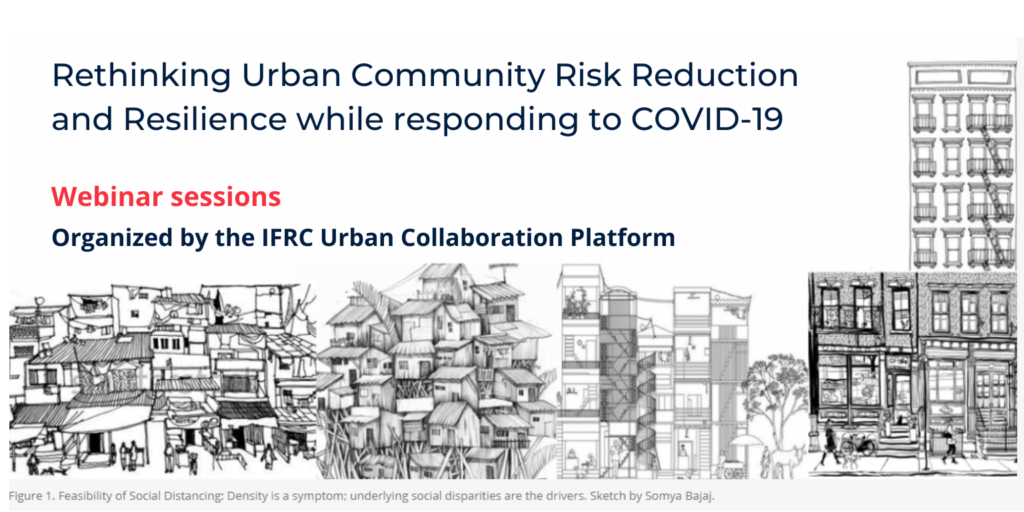Urban Webinars
Scroll down to watch the descriptions and video recordings of the webinars organized by the IFRC Urban Collaboration Platform on a variety of topics such as:
- Rethinking Urban Community Risk Reduction and Resilience while responding to COVID-19
- The Coalition Building process for Urban Resilience
- Heatwaves in cities
- Nature-based solutions for urban resilience
- Urban migration and climate change
- Community Waste Management in Jakarta, Indonesiaole of Informal Governance Systems in Cities
- Role of public spaces in informal settlements in building community resilience and cohesion
- Water Sanitation and Hygiene in urban areas
WEBINARS
Rethinking Urban Community Risk Reduction and Resilience while responding to COVID-19
The COVID-19 pandemic has highlighted that cities are at the front lines of this crisis and will be at the front lines of any similarly globalized crisis in the future. With these four webinars, we aim to unpack the fundamentals of responding to pandemics effectively in urban areas.
The Coalition Building process for Urban Resilience:
Cities are complex environments and addressing disaster, climate change, or other risks requires truly a city-wide collaboration of key stakeholders. For Red Cross Red Crescent (RCRC) national societies and other community-based organizations, working with local governments and municipalities and creating ownership among the existing institutions in the city are critical for finding viable, scalable and sustainable solutions. The coalition-building process is a city-wide civic process to unlock these complexities, to guide and foster participatory solution design, and more importantly leverage local resources. In this webinar, the city coalition-building process under the “Building Urban Community Resilience Project” supported by American Red Cross and USAID-OFDA and implemented by National Societies of Indonesia, Vanuatu and Myanmar is shared.
Presenters: Colin Fernandes (Urban Resilience Project Coordinator) and Jaya Tulha (Project Manager, Indonesia). Watch the webinar here.
Heatwaves in Cities
This webinar organized by the Red Cross Red Crescent Climate Centre has Kate Strachan from ICLEI Africa presenting on urban planning tools to tackle heatwaves, Hunter Jones from Global Heat Health Information Network, and Roop Singh from RCRC Climate Center presenting the impacts of Heatwaves and how to prepare for them.
Presenters: Roop Singh (Red Cross Red Cresent Climate Center), Hunter Jones (National Oceanic & Atmospheric Administration), and Kate Strachan (ICLEI – Local Governments for Sustainability, Africa).
Check the webinar recording here.
Water, Sanitation, and Hygiene in the Urban areas:
This webinar presented by the IFRC, Climate Centre, and Partners for Resilience is focused on Water, Sanitation, and Hygiene services in the urban context. The speakers discussed the challenges and opportunities of providing WASH services in rapidly changing urban environments in Africa and Asia.
The session was part of the series of the Climate Centre urban webinars organized to discuss key urban adaptation needs and potential solutions to address them. Watch the webinar
Nature-Based Solutions for Urban Resilience
This webinar, organized by the Red Cross Red Crescent Climate Centre has Sander Carpaij from Wetlands International presenting on blue -gree urban infrastructure and inclusive approaches in Indonesia and the Philippines.
Presenters: Dr. Shiraz Wajih from Gorakhpur Environmental Action Group presenting peri-urban ecosystems in India and Rumana Sultana from ULAP presenting Harmony with Nature in Dhaka, Bangladesh.
Check the webinar recording here.
Urban Migration and Climate Change:
This webinar, organised by the Red Cross Red Crescent Climate Center focuses on urban migration and climate change.
Presenters: Chandni Singh (Indian Institute for Human Settlements) and Ileana Sinziana Puscas (Migration, Environment and Climate Change team at the International Organisation of Migration -IOM).
Check the webinar recording here.
Community Waste Management in Jakarta, Indonesia:
Many cities in the developing countries have challenges in properly and hygienically collecting and processing waste, which in turn increases the risk of flooding in addition to exacerbating hazards to health. In this webinar, Andre Napitupulu (American Red Cross Indonesia country office) shares the successes, challenges, and lessons learned from the community-based Solid Waste Management initiative that was implemented by the Indonesia Red Cross (PMI) with support from the American Red Cross and local partners in Jakarta, Indonesia. The initiative is linked to other project activities such as community-based disaster preparedness, urban gardening and environmental cleaning campaigns under the Greater Jakarta Urban Risk Reduction and Climate Adaptation Program.
Presenter: Andre Napitupulu (American Red Cross Indonesia country office). Watch the webinar here.
Role of Informal Governance Systems in Urban Disasters
Dr. Rocio Carrero from University College London (UCL) City Leadership Laboratory presents the results of a research on Informal Governance Systems (IGS) in disaster response and recovery, analysing the cases of Sendai (Japan) and Kathmandu (Nepal), hit by the Tōhoku and the Gorkha earthquakes in 2011 and 2015 respectively.
IGS are constituted by individuals and groups connected to each other by non-institutional channels, such as family, neighbours, churches, schools, etc. Cases studies across the globe show that IGS play a fundamental, yet not-well understood, role in disaster risk reduction. Information, knowledge and goods often flow across non-institutional channels, affecting communities’ ability to access resources and processes. A better understanding on IGS is therefore critical to launch effective actions when preparing for, coping with or recovering from a disaster.
Watch the webinar here.
Role of public spaces in informal settlements in building community resilience and cohesion:
Tapis Rouge is one of several public spaces in Carrefour-Feuilles, Haiti, built under the program LAMIKA, whose acronym stands for “A better life in my neighbourhood” in Haitian Creole. The program, funded by the American Red Cross and implemented by Global Communities, aims to construct multifunctional spaces that facilitate and promote social cohesion through an inclusive approach.
In this webinar, Andrea Panizzo from EVA Studio talks about the importance of open public spaces in strengthening community cohesion and how participatory design approaches applied in creating this public space in Tapis Rouge. Watch the webinar here.

